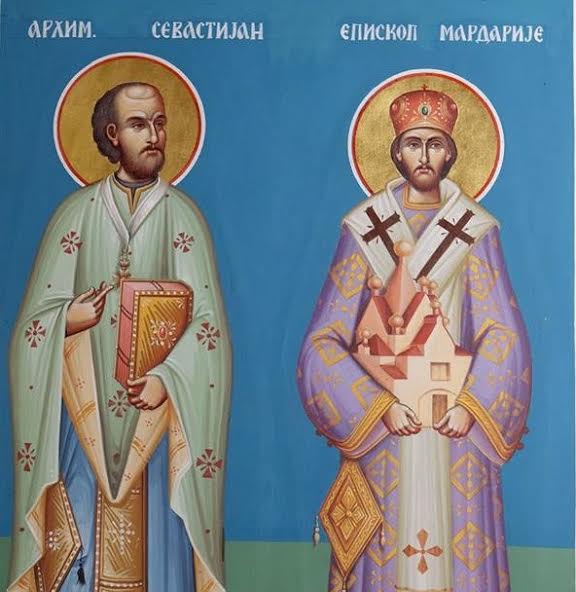Both saints are being recognized as “preachers of the Gospel, God-pleasing servants of the holy life, and inspirers of many missionaries” for their pastoral labors in America and their homeland.
The glorification came in response to a recommendation by the Episcopal Council of the Serbian Orthodox Church in North and South America.
The annual commemorations of Saint Mardarije of Libertyville, Bishop of America-Canada, and Saint Sebastian of Jackson will be observed on November 29/December 12 and November 17/30 respectively.
Saint Sebastian was born Jovan Dabovich in San Francisco, CA in 1863—in the midst of the US Civil war. His parents were Serbian immigrants from Sassovae. From his early youth he was devoted to the Church and spent much of his time at the city’s Holy Trinity Cathedral, where he later served as a reader and teacher. In 1884, he was assigned to assist at Archangel Michael Cathedral, Sitka, AK. Shortly thereafter, he was sent to Russia for training and formation as a missionary priest. After completing three years of studies at the Saint Petersburg and Kyiv Theological Academies, he was tonsured to monastic rank and ordained to the diaconate in 1887.
Returning to San Francisco, he served as a deacon at the cathedral and taught in the newly established pastoral school. On August 16, 1892, he was ordained to the priesthood and assigned to pursue missionary work in California and Washington. The following year, he succeeded Father [now Saint] Alexis Toth as rector of Saint Mary Church, Minneapolis, MN and taught at the Missionary School.
In 1894, Father Sebastian returned to California, where he established the first Serbian Orthodox parish in the US in Jackson, CA. Two years later, he was reassigned to San Francisco’s Holy Trinity Cathedral while continuing his missionary efforts in Jackson. In recognition of his abilities, Archbishop Tikhon assigned him as part of the North American Mission’s Administration. During this time he wrote a book titled The Ritual, Services and Sacraments of the Holy Orthodox Church. In 1902, he was transferred to Alaska, where he served as Dean of the Sitka Deanery.
With the development of additional Serbian parishes in the US, Archbishop Tikhon reassigned Father Sebastian to head the Serbian Mission in America in 1905. The Mission was based in Chicago, where Archimandrite Sebastian had organized and served as rector of Holy Resurrection Serbian Orthodox Church. He continued to guide the Serbian Mission through July 1910, when at his own request he returned to missionary work. With the opening of Saint Platon Seminary, Tenafly, NJ in 1913, he served as a member of the faculty and also was involved in numerous conferences and discussions with non-Orthodox Christian confessions. In these meetings, he was sympathetic and understanding, yet firm in his desire to reveal Orthodox Christianity as the fullness of truth and the Church of Christ.
While Archimandrite Sebastian was obviously a candidate for the episcopacy is America, he likewise felt the calling to minister in his ancestral Serbia. He served as a chaplain to the Serbian Army during the Balkan War and World War I. In 1916, he requested a release from the North American Mission to serve in Serbia, where he ministered for the remainder of his life. He fell asleep in the Lord on November 30, 1940 and was interred in the Monastery of Zicha by his friend and Father Confessor, Bishop Nikolai [Velimirovic].
Saint Mardarije was born Ivan Uskokovic in Podgoritsa, Montenegro, in 1889. In 1907, he embraced monasticism at the Studenitsa Monastery and then relocated to Russia to study at the Saint Petersburg Theological Academy. After graduation, he was ordained by the Russian Orthodox Church and sent as a missionary to America. In 1919, he was one of five Serbian Orthodox priests who participated in the Second All-American Sobor, held in Cleveland, OH in February 1919, at which time it was recommended that the Serbian Church in Belgrade advance him to the episcopacy to organize a Serbian Orthodox Diocese in America. Unfortunately, at this most chaotic time in the history of the Russian Orthodox Church, it was impossible to secure the written blessing of Patriarch [now Saint] Tikhon of Moscow. Later in 1919, Archimandrite Mardarije returned to Belgrade, where he was assigned as head of the Rakovitsa Monastery and principal of its monastic school. Subsequently, Bishop [now Saint] Nikolai [Velimirovic] of Ohrid was sent by Patriarch Dimitriye to administer the fledgling diocese. Having likewise returned to America, Archimandrite Mardarije served as Saint Nikolai’s Deputy for two years, and continued to administer the diocese after the latter’s return to Belgrade.
On April 26, 1926, Archimandrite Mardarije was consecrated to the episcopacy in Belgrade. Prior to his episcopal consecration, he had carried out most of the actual work of organizing the Serbian diocese. He also served as parish priest in Chicago and purchased with his personal funds the land for Saint Sava Monastery in suburban Libertyville.
From the moment of his return to America, Bishop Mardarije undertook a wide range of ministries. He did not spare himself, nor did he fear work, although he knew that he was gravely ill with an advancing case of tuberculosis. In 1927, he convened the first National Church Assembly of the Serbian Orthodox American-Canadian Diocese to address a variety of organizational issues. At a clergy conference held in Youngstown, OH in 1931, he renewed his appeal for all to work for the unity and good of the diocese. His kindness, patience and reluctance to use punitive measures resulted in a great measure of unity within the diocese by the time of his repose on December 12, 1935 at the age of 46 years. He was interred at Libertyville’s Saint Sava Monastery.

















